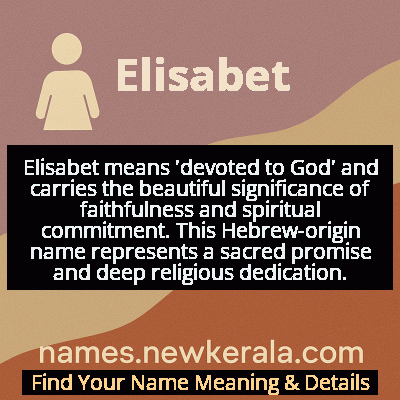Elisabet Name Meaning & Details
Origin, Popularity, Numerology Analysis & Name Meaning of Elisabet
Discover the origin, meaning, and cultural significance of the name ELISABET. Delve into its historical roots and explore the lasting impact it has had on communities and traditions.
Name
Elisabet
Gender
Female
Origin
Hebrew
Lucky Number
1
Meaning of the Name - Elisabet
Elisabet means 'devoted to God' and carries the beautiful significance of faithfulness and spiritual commitment. This Hebrew-origin name represents a sacred promise and deep religious dedication.
Elisabet - Complete Numerology Analysis
Your Numerology Number
Based on Pythagorean Numerology System
Ruling Planet
Sun
Positive Nature
Leaders, ambitious, highly driven, self-reliant, innovative.
Negative Traits
Overly aggressive, domineering, impatient, selfish.
Lucky Colours
Red, orange, gold.
Lucky Days
Sunday.
Lucky Stones
Ruby, garnet.
Harmony Numbers
2, 3, 9.
Best Suited Professions
Entrepreneurs, managers, engineers.
What People Like About You
Courage, determination, leadership.
Famous People Named Elisabet
Elisabet of Bavaria
Queen Consort
Empress of Austria and Queen of Hungary, known as 'Sisi', famous for her beauty and tragic life
Elisabet Ney
Sculptor
German-American sculptor who created portraits of famous European and American figures
Elisabet Benavent
Author
Spanish novelist known for her bestselling romance and contemporary fiction works
Elisabet Strid
Opera Singer
Swedish dramatic soprano acclaimed for Wagnerian roles in major European opera houses
Name Variations & International Equivalents
Click on blue names to explore their detailed meanings. Gray names with will be available soon.
Cultural & Historical Significance
In Scandinavian cultures, Elisabet has maintained consistent popularity for centuries, often associated with strong, independent women who balance traditional values with modern sensibilities. The name appears frequently in Swedish, Norwegian, and Danish royal lineages and has been borne by numerous saints and influential historical figures. In Spanish-speaking regions, the Elisabet spelling is particularly common in Catalonia, where it represents both religious devotion and regional cultural identity. The name's endurance across centuries and cultures speaks to its universal appeal and the powerful symbolism it carries.
Extended Personality Analysis
Women named Elisabet are often perceived as strong-willed, intelligent, and principled individuals with a natural leadership quality. They tend to be deeply loyal to their beliefs and commitments, reflecting the name's meaning of devotion. Elisabets are typically organized, responsible, and possess excellent communication skills, often excelling in fields requiring diplomacy and intellectual engagement. Their combination of inner strength and compassionate nature makes them both respected and beloved by those around them.
Many Elisabets display a balance of traditional values with modern thinking, creating individuals who honor heritage while embracing progress. They are often seen as pillars of their communities or families—reliable, wise, and capable of providing guidance during challenging times. The name suggests someone with depth of character, someone who thinks carefully before acting but who, once committed to a course of action, pursues it with determination and integrity. This combination of thoughtfulness and resolve makes Elisabets particularly effective in leadership roles where both compassion and strength are required.
Modern Usage & Popularity
Elisabet remains a popular name in Scandinavian countries, Spain, and Catalonia, maintaining its classic appeal while feeling distinctive in English-speaking countries. The name has experienced steady usage rather than dramatic popularity spikes, making it a timeless choice that avoids being overly trendy. In recent years, there's been a resurgence of interest in traditional names with strong meanings, which has kept Elisabet relevant. It's particularly favored by parents seeking a name that's both internationally recognizable and culturally specific to certain European heritages. While not among the top 100 names in most English-speaking countries, Elisabet maintains a consistent presence, often chosen by parents who appreciate its elegant sound, rich history, and the strength of character it suggests.
Symbolic & Spiritual Meanings
Symbolically, Elisabet represents faithfulness, wisdom, and divine connection. The name carries connotations of covenant and promise, reflecting its original meaning of being devoted to God. It symbolizes the balance between strength and grace, tradition and progress. In many cultures, the name is associated with royalty and nobility, representing dignity, leadership, and enduring values. The symbolic meaning extends to concepts of loyalty, intellectual depth, and moral integrity, making it a name that suggests both inner strength and compassionate understanding. The name also carries symbolic weight in religious contexts, representing devotion, miraculous possibilities (referencing Elizabeth's conception of John the Baptist in old age), and the fulfillment of divine promises.

